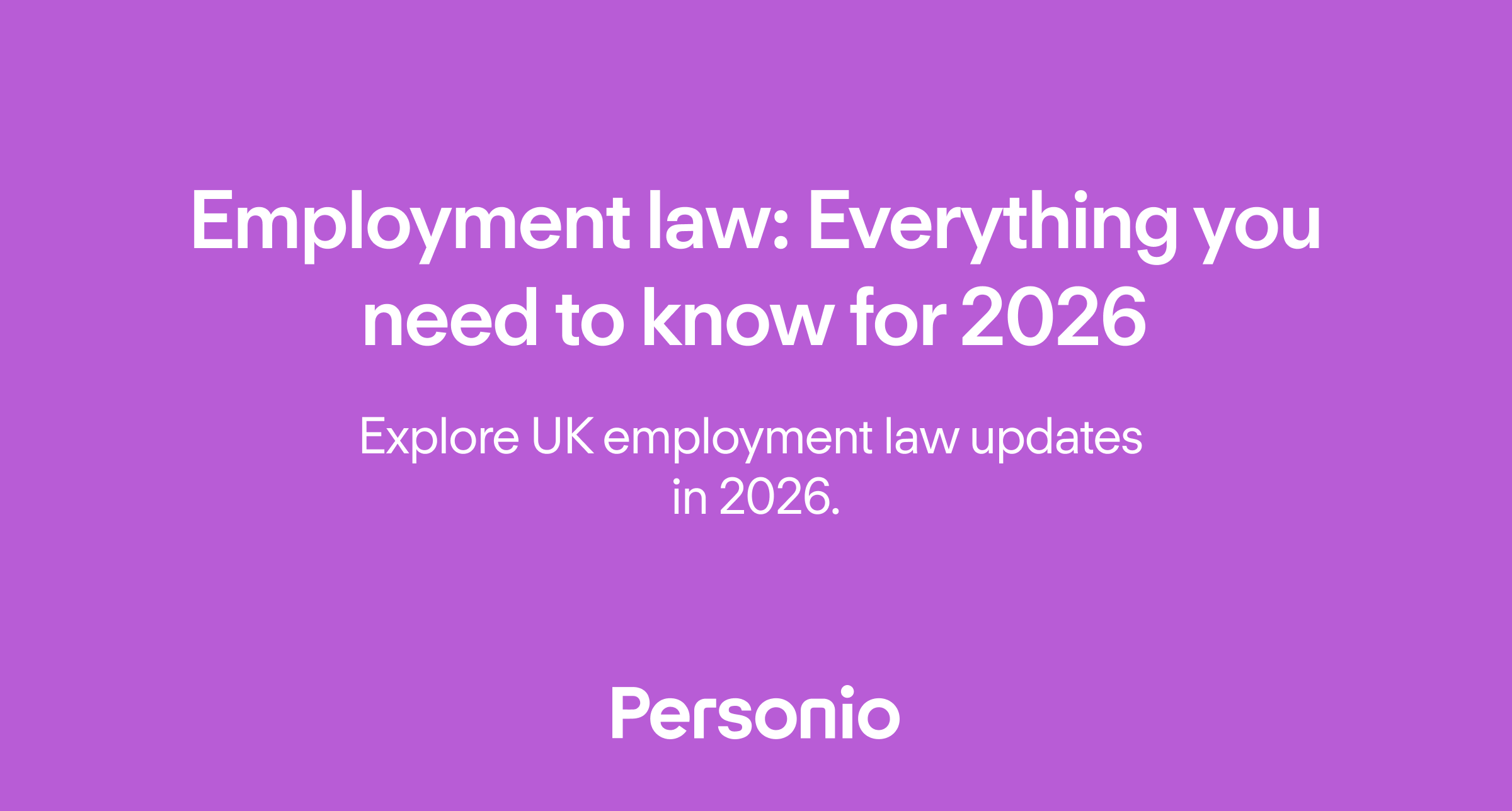10. November 2025
UK employment law: Everything you need to know for 2026

As the UK continues to reshape its labour landscape, 2026 is set to be a defining year for employment law. With the introduction of the Employment Rights Bill and the government’s “Make Work Pay” agenda, HR professionals, employers, and employees must prepare for major reforms that will change how workplaces operate. This guide outlines the most significant updates, how they impact employment rights, and what organisations can do to stay compliant and ready.
What is employment law?
Employment law governs the relationship between employers and employees, setting the rules for how modern workplaces operate. It covers a wide range of topics, including contracts, wages, working conditions, discrimination, dismissal, and health and safety.
In the UK, these employment laws are designed to protect workers’ rights while ensuring businesses operate fairly and legally. Understanding these laws is essential for HR teams and business leaders to ensure compliance.
UK employment law changes in 2026
The UK’s employment law landscape is evolving rapidly, with 2026 set to bring some of the most significant changes in recent years.
Building on reforms introduced in 2025, the Employment Rights Bill will introduce modernised protections and strengthen job security for millions of employees. For HR professionals and employers, understanding these changes in advance is critical to preparing policies, training teams, and ensuring a smooth transition to compliance.
Here’s what’s changing and what it means for employers:
1. Day-one employment rights
Employees will now have unfair dismissal protection from their first day of employment, ending the previous two-year qualifying period. They will also be entitled to receive written reasons for dismissal upon request from day one. This major shift reflects a national focus on fairer treatment and reducing job insecurity.
2. Statutory sick pay (SSP) reform
The Employment Rights Bill will expand access to Statutory Sick Pay:
Lower earnings limit: This will be removed, extending SSP to over 1.3 million low-paid workers.
Waiting period: The three-day waiting period will be abolished, allowing SSP from the first day of illness.
These updates are designed to reduce financial hardship and ensure all employees receive fair support during periods of sickness.
3. Parental and paternity leave
From 2026, employees will gain day-one eligibility for both unpaid parental leave and paternity leave. Previously, these rights required 26 weeks of continuous service. The change ensures that new parents can access essential support immediately, helping organisations build family-friendly and inclusive workplaces.
4. Fire and rehire restrictions
The controversial “fire and rehire” practice will face tighter regulation:
Alternative requirement: Employers must demonstrate there are no reasonable alternatives before dismissing employees.
Unfair dismissal: Dismissals under these circumstances may now be deemed automatically unfair.
This reform aims to prevent exploitative contract changes and strengthen trust between employers and employees.
5. Third-party harassment liability
Employers will become directly liable for harassment by third parties, such as customers, clients, or suppliers, unless they can prove they took all reasonable steps to prevent it.
This change reinforces the importance of safe, respectful workplaces and places greater responsibility on employers to uphold those standards.
6. Trade union and collective rights
Reforms will also strengthen trade union and collective bargaining rights, including:
Union recognition: The process will be simplified to make collective engagement easier.
Industrial action: Protections for participation in industrial action will be strengthened.
These changes are intended to enhance workplace democracy and give employees a clearer voice in how their organisations operate.
7. Launch of the fair work agency
A new Fair Work Agency will be established to:
Enforce employment standards
Support workers in disputes
Prevent non-compliant employers from undercutting fair businesses
This body will play a central role in delivering the “Make Work Pay” vision, ensuring reforms translate into real workplace improvements.
How do UK employment laws protect workers’ rights?
UK employment law provides a robust framework designed to protect workers’ rights and promote fairness across the workplace. From minimum wage and holiday entitlements to anti-discrimination protections and whistleblower safeguards, these laws create a baseline of fairness and security for all employees. The 2026 reforms will strengthen these protections even further, making workplaces safer, more inclusive, and better aligned with modern employment standards.
How do UK employment laws differ from those of other countries?
The UK already offers:
Strong protections against unfair dismissal
Comprehensive anti-discrimination legislation
A well-established employment tribunal system for resolving disputes
However, the UK has historically fallen behind some European nations in areas such as sick pay and union representation. The 2026 reforms are designed to close these gaps and align the UK with international best practice.
HR employment law: what employers need to do
For HR professionals, proactive preparation for the impending employment law changes is key. Organisations should take the following steps to ensure compliance and readiness:
Update contracts and policies to reflect day-one rights and new SSP rules.
Train line managers on dismissal procedures, third-party harassment responsibilities, and family leave entitlements.
Review parental and paternity leave policies to confirm they meet updated eligibility standards.
Engage with trade unions and prepare for expanded collective bargaining rights.
A structured, transparent approach will not only help maintain compliance but also build trust and retention across the workforce.
Next steps: make work pay
The “Make Work Pay” initiative is more than just policy. This long-term strategy aims to raise living standards for employees and improve working conditions nationwide.
Next steps include:
Bill rollout: Full implementation of the Employment Rights Bill will continue throughout 2026.
Enforcement: The Fair Work Agency will monitor compliance and support workers in disputes.
Consultations: Further government consultations on workplace reforms will shape the future of UK employment law.
Employers should stay informed and adapt their HR strategies as the new framework takes shape.
Preparing for employment law changes in 2026
The employment law changes arriving in 2026 mark a turning point for UK workplaces. With new rights, protections, and enforcement measures, organisations will need to evolve their policies, training, and compliance strategies.
For HR professionals, business owners, and employees, understanding these updates is essential to navigating the modern world of work.
Stay informed. Stay compliant. Because in 2026, employment law is changing for good.

